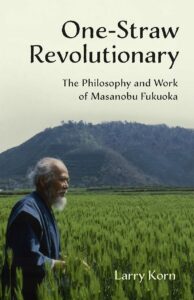Masanobu Fukuoka (2 February 1913 – 16 August 2008) was a Japanese microbiologist and philosopher renowned for pioneering the “shizen nōhō,” or “natural farming,” method, which he often described as the ‘do-nothing’ approach.
Initial research career
Initially beginning his career as a researcher, Fukuoka felt a profound disconnection from modern society. This sentiment prompted a transformative spiritual experience one night, during which he realized that the world, as perceived, was a mental construct with no inherent reality.
This awakening led him to embark on a quest for meaning and construct a life akin to a utopia.
The natural farming approach
Fukuoka founded his own farm, committing himself to self-sufficiency through the exclusive use of natural methods. His innovative approach involved minimal human intervention and eschewed modern machinery, fossil fuels, fertilizers, and chemicals.
Remarkably, despite these unconventional practices, his rice yields rivaled Japan’s most productive farms. Fukuoka’s life and work left an indelible mark, inspiring others to reconsider the harmony between humanity and nature in pursuing sustainable living.
Option 1: Select a Plan to Gain Full Platform Access
Option 2: Use Your Credits to Unlock This Article
Unlock credits cost:4
Available credits: N/A
Buy More Credit
International recognition
 Throughout his life, Fukuoka authored several influential books, including ‘The One-Straw Revolution‘, in which he shared his insights and experiences.
Throughout his life, Fukuoka authored several influential books, including ‘The One-Straw Revolution‘, in which he shared his insights and experiences.
His teachings attracted attention globally, inspiring a new generation of environmentalists, farmers, and thinkers.
Fukuoka’s dedication to natural farming extended beyond his fields; he traveled extensively, delivering lectures and workshops and spreading the message of sustainable practices and ecological consciousness.
In recognition of his impactful contributions, he received numerous accolades, including the Deshikottam Award from Visva-Bharati University in India.
Conclusion
Masanobu Fukuoka legacy endures as his ideas continue to shape conversations around ecological sustainability, organic farming, and a profound connection between humanity and the environment.
Fukuoka’s life remains an inspiring narrative of an individual who, through a profound spiritual awakening, reshaped his existence and left an enduring legacy for future generations.
Who is your permaculture S/Hero? Leave a comment to let us know



